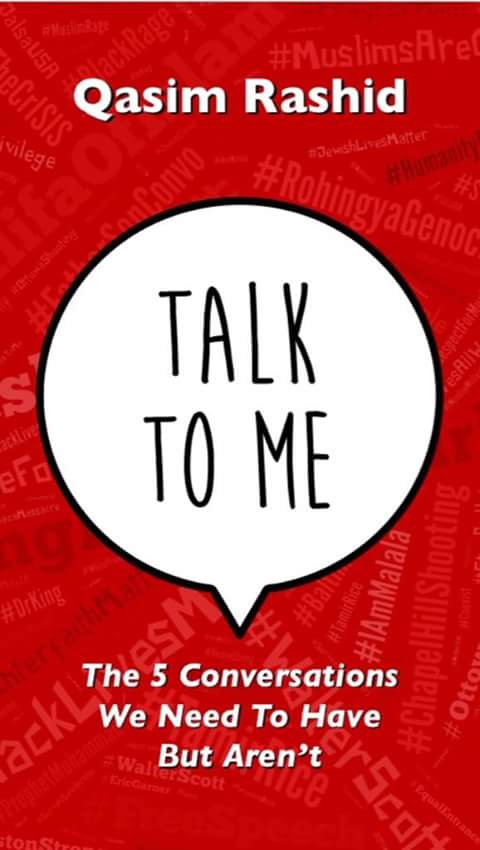The Baltimore uprising, the Ferguson protests, the Chapel Hill murders, the Charleston terrorist attack, and the Chattanooga terrorism all remind me why I wrote #TalkToMe: The Five Conversations We Need To Have, But Aren’t.
In the Chapel Hill attack, an anti-theist murdered innocent Muslims. In Charleston, a white supremacist radicalized by Christian extremists murdered nine innocent Black Christians. In Chattanooga, a deranged Muslim with a history of substance abuse and depression murdered five innocent U.S. military personnel.
There is a common denominator in each of these horrific atrocities: None of the attackers knew the first thing about their victims.
Rather than learning about Islam from Muslims, the anti-theist Craig Hicks opted to voice his opinion using violence. Rather than learning about his fellow Black human beings, Dylann Roof murdered them in cold blood, after spending time with them in prayer. Rather than express his concerns to our military members a peaceful manner, Mohammad Abdulazeez went on a murderous killing spree.
Without any form of meaningful communication and dialogue, there’s only one thing that can–and will–ensue: Violence.
The public’s double standards regarding violence and terrorism became glaringly evident in the discourse surrounding the tragedies, further aggravating the situation. When Black Americans rose up in Baltimore after the brutal murder of Freddy Gray at the hands of police, pundits were more worried about broken windows than broken backs, as activist Deray so eloquently surmised. In Ferguson, despite the incomprehensible amounts of evidence of generational and systemic discrimination against Black Americans, the media narratives generally referred to people of color as animals and thugs. Meanwhile, white Americans rioted in the streets in response to concerts, sports, and pumpkin festivals, only for it to be said that they were “rowdy” and “taking it to the streets.” After a white biker gang fight in Texas left nine dead, police referred to the violent bloodshed as a “misunderstanding” and “scuffle.” When white supremacists armed themselves with heavy weaponry and protested at a mosque in Phoenix, it was labeled a “free speech” event.
I saw the problem as two-fold. First, systemic injustices and people of color and religious minorities pervade headlines and public discourse. The denial of racism, Islamophobia, and anti-Semitism only ensures these xenophobic practices will continue. Secondly, the voices we need to hear to overcome these cancers are either drowned out or ignored. White privilege, subconscious bias, and micro-aggression dominate Hollywood, news reporting, and even the classrooms, where young minds are being molded. I guarantee a significant number of people reading this have never even heard the terms white privilege, subconscious bias, and micro-aggression. We’re not hearing from the people we need to hear from to change this narrative of intolerance and fear, and that’s a problem.
#TalkToMe changes this narrative by giving a platform to the very voices that the current public discourse ignores, taking on the motto “Nothing about me without me,” allowing oppressed and marginalized peoples to speak on their own behalves, as opposed to the so-called talking heads and “experts” who further oppress them by denying them their own voice and their own narrative. #TalkToMe is a non-fiction memoir with contributions from inspiring activists and brilliant minds, fostering a dialogue on the topics of race, religion, leadership, parenting, and death. It includes wisdom from Black pastors, Jewish scholars, Catholic interfaith activists, atheist humanists, Muslim women scholars, moms of color, and Black Muslims. Until we can learn from those suffering through the aforementioned persecution, injustice, and violence, we have little hope of actually curing the cancers that plague our society.
#TalkToMe argues that we need words not wars, education not demonization, and compassion, not confrontation. #TalkToMe is not merely hypothetical dialogue, or a theoretical framework for understanding marginalization; instead, #TalkToMe provides practical solutions to the rising levels of intolerance we see in our society, and demonstrates how these solutions can ensure the world we create for our future generations is better than the world we’re in right now.
#TalktoMe is in its final stages of crowdfunding; I hope you become a backer. And you should become a backer to #TalkToMe if you believe we need to give a voice to women, people of color, and compassionate activists who are ignored in the public discourse. This is a conversation we need to have because the alternative is to choose a life of isolation, fear, and distrust of one another.
That’s no way to live.
Sadly, I know it is only a matter of time before there’s another mass shooting, before there’s another police killing, and before there’s another act of terrorism, but it doesn’t have to be this way. We can work together. Indeed, we need to work together to ensure these cancers stop dead in their tracks, as opposed to continuing the current narratives which divide us against each other.
United we stand; divided we fall.
So come on, take a minute to change the conversations we’re having, and #TalkToMe.
Qasim Rashid is a best-selling author and attorney. His latest book, #TalkToMe, is due out in December. Follow him @MuslimIQ and like him on Facebook.
Edited by April Ricchuito
